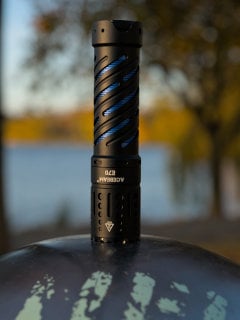Hi Anduril user’s !
I noticed that the momentary turbo does not work for 4H from the “ON” state (3H for those who do not have tint ramping).
To fix it, I have to comment out line 423:
if (! arg) { // first frame only, to allow thermal regulation to work
Do you have the same behavior?
Thank you and good day


Good question, just wanted to point out your link
markdown is broken but copy-pasting the url works.
Thank you, I fix it. Does Momentary Turbo 3H/4H work four you?
I don’t own a multi-channel, but I did see something that looks interesting in the code (not familiar with the codebase and haven’t worked with C much):
Could be a red herring but the function
channel_has_argslooks kind of like it might be doing the same work asif(!arg)for single-channel. Again this could be totally wrong but IF that were the case, then I’d expect that adding to the if statement could potentially help catch this? Likeif (! arg) || (! channel_has_args(cfg.channel_mode).Also in following the code style the actual statement would also need to include an IFDEF for multi-channel-config but maybe not necessary for you test locally?
So Mementary Turbo 3H work for you? If you don’t own multi channel, MT should be 3H from ON. I think l423 be identical for simple or multi channel.
I can’t find where arg should be equals to 0… steady_state always call with arg <> 0
Sorry for the extraneous information about the ifdef. The important part was whether adding this extra check would fix the bug in the same way as deleting the original line did.
From what I could assume in the comments, this refers to the very first state in that steady-state (“first frame”) right when you have done 4H. Then it sets the current level to the appropriate turbo (
set_level_and_therm_target).Your bug would be that it never set the level to turbo because it never executed
set_level_and_therm_targetbecause! argevaluates to false.Your bug fix was to delete the check, but that means that every instant it will keep trying to set the level to turbo instead of just setting it during the first frame and then maintaining the steady-state.
My potential fix was to add something so that the statement
if (! arg) || (! channel_has_args(cfg.channel_mode)would evaluate to true during the first frame so it can then callset_level_and_therm_targetexactly once.@[email protected] (if you have a moment) does this seem close to the mark?
I test that asap. I already try to comment it and it’s work fine :
//if (! arg) { // first frame only, to allow thermal regulation to work uint8_t tl = style_2c ? 150 : turbo_level; set_level_and_therm_target(tl); //}But I am surprised that the functionality appears in the diagram and that no one remarks that it does not work (3H without Multi channel or 4H with) https://lemmy.world/post/1038159
It appears in the diagram because it works. Just tested it again on my dual-channel D4V2, and it works like a charm.
On reflection i think this is incorrect.
argseems to represent the output level as of when the event was triggered.